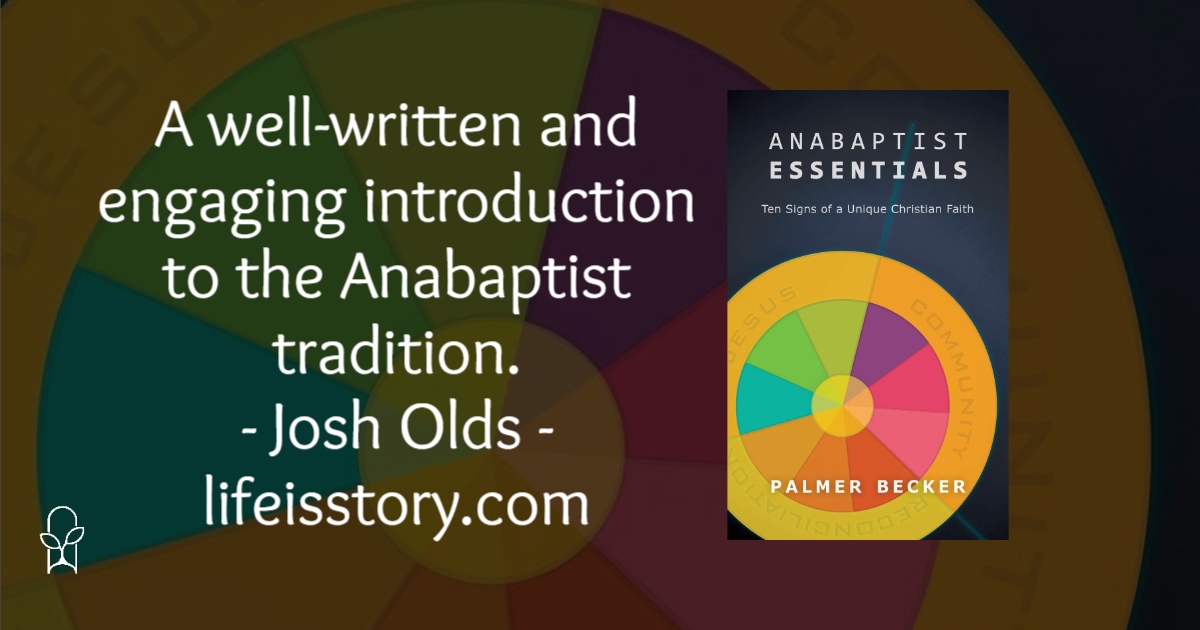
Published by Herald Press on March 7, 2017
Genres: Non-Fiction, Theology
Buy on Amazon
Goodreads

What is the essence of Anabaptism?
Jesus. Community. Reconciliation. These sum up the core values of Anabaptist faith and life, writes pastor Palmer Becker in this concise new resource. In Anabaptist Essentials, Becker introduces readers to the key convictions and practices of Anabaptism, the Christian tradition of the Amish, Mennonites, and Brethren in Christ. From the believers within a sixteenth-century movement to those today who try to follow Jesus, create community, and practice peace, Anabaptists have a rich witness to offer the wider world. Designed for study by small groups and for use as a resource for Christian formation and conversation, this clear, readable guide to what makes Anabaptism unique will equip readers to live out a more radical commitment to Jesus.
Over my years in ministry, I found myself accidentally an Anabaptist. Most of this had to do with practical theology and shifting political alignments in my own personal philosophy that led to an increased emphasis on living the Gospel and advocating for justice. Ron Sider’s Rich Christians in an Age of Hunger was a major influence on me. And then I got introduced to Herald Publishing—the publishing wing of Mennonites USA—with a book by Drew Hart called Who Will Be a Witness. And then, of course, there’s the Anabaptist-adjacent Shane Claiborne. I’d never really felt at home in a denomination, but could this be where I fit? I decided the answer was yes shortly before moving to a country with zero Anabaptist churches. I figured it behooved me, if I ever wanted to officially be part of the movement, learning more about its history and theology would be a pretty good start.
Anabaptist Essentials by Palmer Becker is a concise and accessible guide to the key beliefs and practices of the Anabaptist tradition. This book is an essential resource for anyone who wants to better understand the Anabaptist perspective and its relevance to contemporary Christian faith. Becker provides an overview of ten different Anabaptist distinctives, distilling Anabaptism into the sentence: “Anabaptist believes see Christianity as discipleship, the church as a brotherhood, and Christian practice as an ethic of love and nonresistance.” That gets turned into three elements: 1) Jesus, the center of our faith, 2) Community, the center of our life, and 3) Reconciliation, the center of our work. In just a couple of sentence, Palmer Becker invited me into a theological home where I knew I’d be welcomed.
Becker begins by providing an overview of the history of the Anabaptist movement, tracing its origins to the 16th century Reformation and highlighting its distinctive emphasis on personal faith, nonviolence, and community. He then explores the Anabaptist understanding of key theological concepts such as salvation, discipleship, and the church, offering insights into how these concepts are lived out in Anabaptist communities. One of the key themes of the book is the idea of the church as a community of believers who are called to live out their faith in tangible ways. Becker emphasizes the importance of shared accountability, mutual support, and service to others as essential aspects of Anabaptist faith. Another important theme is the Anabaptist commitment to nonviolence. Becker explores the biblical foundations for this belief and its practical implications for issues such as war, capital punishment, and social justice.
Throughout the book, Becker draws on his own experiences as an Anabaptist pastor and teacher to illustrate his points. He also provides practical suggestions for how readers can apply Anabaptist principles to their own lives and communities. My favorite part of the book was the reflection questions at the end that included a table that offered a contrast between Anabaptist Christianity and most other denominations. Anabaptist Essentials is clear that other Christians aren’t necessarily or inherently wrong—sometimes the difference is the place of emphasis—but rather that these are the issues that make Anabaptism unique within orthodoxy.
Overall, Anabaptist Essentials is a well-written and engaging introduction to the Anabaptist tradition. Becker’s clear and accessible writing style makes this book a valuable resource for anyone who is interested in exploring Anabaptist theology and practice. I’ll be coming back to this one again and again.
